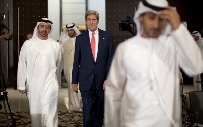| Mon. May 19, 2025 | |

|
|
|
 By Chris Solomon The Obama Administration is racing to use its remaining time in office to set the stage for the Democratic Party’s presidential nominee in 2016 and to secure a legacy. President Obama campaigned in 2008 on out to Iran and ending the Iraq War. A large part of this will be using foreign policy to create some semblance of achievement and reasserting the geopolitical balance in the Middle East. The Republicans will attempt to strengthen ties with old alliances such as Egypt, Turkey, and the Gulf Arab states and to pursue a more aggressive Syria agenda. Iraq and Syria Senator John McCain and Senator Lindsey Graham have led the criticism of President Obama’s response to the Syrian crisis. Once Sen. McCain becomes the chairman of the Senate’s Armed Services Committee this January, there will be a renewed push for a no-fly zone or a buffer zone in northern Syria. Republican Senator Bob Corker will head the Foreign Relations Committee. Congress is expected to pass an extension to the Authorization for Use of Military Force (AUMF) bill worth $5.6 billion. Momentum is shifting towards ending the distinction between the Syrian government and the Islamic State (IS) as the US continues its air offensive against the militant group in Iraq and Syria. This, along with efforts to placate Turkey, could culminate in some type of limited military engagement against the Assad regime in Syria. Despite Assad’s willingness to engage in a new UN peace deal, the arrest of an Alawite opposition leader, Louay Hussein, signals the regime feels increasingly at unease with its primary support base. Along with the new troop deployments to Iraq, the Obama Administration may reverse course on defense sequestration during negotiations with Senate leaders. This would bring relief to the defense industry. Defense contractors Raytheon and Boeing have recently signed new contracts for advanced weapon systems to be used in Operation Inherent Resolve. Job layoffs surrounding the defense industry may be a component in the 2016 elections. Iran The risk remains that a military venture against the Assad regime will scuttle the long term reconciliation between the US and Iran. However, achieving a nuclear settlement could result in Iran using its leverage over the Syrian regime for a political solution that would effectively end the civil war. This, along with grumblings among the Syrian regime’s supporters, could result in Assad’s replacement with an Alawite caretaker government that would both ensure stability and retain Iran’s influence. As for Iran, a direct banking channel scheme is one of the offers the US is dangling in front of the Islamic Republic. This would ease personal remittances and provide a route for commercial transactions as well as give the green light to the European banks. President Obama knows that synergy with Iran is vital to stabilizing Iraq and Syria. He also wants to end the nuclear standoff to remove the possibility of a future war with Iran from the equation for the next president. However, the new GOP-led congress will push hard to pass new sanctions that could undermine this effort. Israel and the Palestinians Israel’s economy continues to struggle in the wake of last summer’s Gaza conflict. The Bank of Israel is likely to reduce interest rates in order to weaken the shekel. Netanyahu’s governing coalition could collapse if the next few months fail to pass a budget, bringing about early elections in 2015. As more EU countries recognize the State of Palestine in the next few years, the US will do its best to diplomatically support Israel while pushing for an end to settlement expansion and return to peace talks. 106 retired generals and intelligence officials recently called on Prime Minister Netanyahu to take advantage of the Saudi peace initiative while there was still time. President Obama, seeking a means to ensure his political legacy, may attempt to goad the Israelis back to the negotiating table or at the very least, lay the groundwork for peace talks for the next president. North Africa and the Arab Gulf States Attention to the authoritarianism and domestic abuses of the new Egyptian government will continue to grow. The US has authorized $575 million of the annual $1.3 billion in military aid to Egypt. Despite the dismay of the international community, the GOP-led Senate will be eager to shore up the relations with the el-Sisi’s government on security issues. Egyptian human rights NGOs may find themselves increasingly put on the back burner as government cracks down on foreign donors, financial assistance and fundraising. With Cairo hosting the Arab Business Owners and Investors Conference later this November, Egypt will continue to signal that it is once again open for foreign investment and the turbulent days of the Arab Spring are behind it. The UAE has grown its military capacity and is expanding its number of fighter jets along with acquiring anti-missile systems worth $7 billion from the US. With Egypt and the UAE taking part in operations against Islamist militias in Libya, the US has the difficult chore of repairing damaged ties with longstanding allies while urging restraint with the crackdown on moderate Islamists parties. First published in Global Risk Insights.
|
|
| Contact Us | About Us | Donate | Terms & Conditions |
|
All Rights Reserved. Copyright 2002 - 2025
